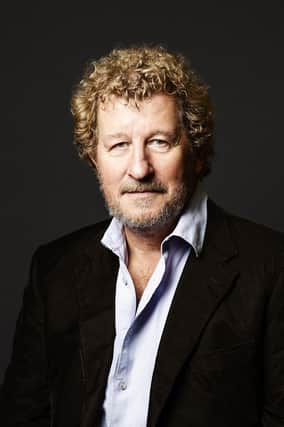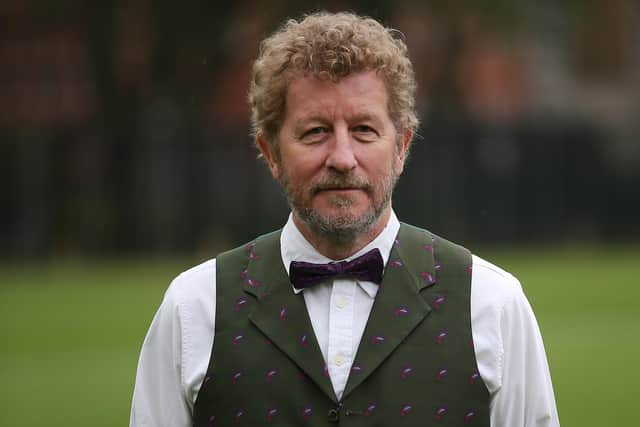Bradford Lit Fest: Birdsong author Sebastian Faulks talks about the relevance of his war novel 30 years on


Sebastian Faulks is looking forward to returning to Bradford – more than 40 years since his first visit. “I was working for the Sunday Telegraph and I was covering the story of a head master at a local school who was uneasy about the way he felt some Muslim school children we being educated. I didn’t know a great deal about it and I found it very interesting and have always wanted to go back and revisit the area.”
Faulks will get the chance when he appears at the Bradford Literature Festival later this month. He has written 19 books, of which A Week in December and The Fatal Englishman were number one in the Sunday Times bestseller lists. But he is probably best known for Birdsong, part of his French trilogy which celebrates it 30th anniversary this September and he will be discussing it and its relevance today at the BLF.
Advertisement
Hide AdAdvertisement
Hide AdFaulks father, Peter, fought with Yorkshire Regiment, the Duke of Wellington’s, in WW2. His maternal grandfather, Philip Lawless, fought in WW1 and was killed in WW2 while reporting on the American advance into Germany.


“I grew up in the sixties my parents had fought in the Second World War and my grandparents in the First World War. It is about trying to understand the world in which we live and how it was shaped, and how we fail to learn from what has gone before,” says Faulks.
"Very little was written about the First World War in the novels I read. There were the great war poets, but I felt there was a gap and that it had fallen out of people’s consciousness as there was so much more known about the Second World War which seems to feature in books and films even though it was only 20 years later, I felt a visceral duty to redress that balance and fill the gaps.”
A trained journalist, Faulks set about researching his subject thoroughly as her felt keenly the responsibility of reflecting the young men’s experience in the trenches despite never having been there himself.
Advertisement
Hide AdAdvertisement
Hide Ad"I went on a visit to the Western Front with a group of old soldiers with military historian Lyn Macdonald. Talking to these old guys gave me a real sense of what they had been through. It wasn’t something in a history book but something that had happened to real men. They were all in the nineties and they had told these stories so many times that even they weren’t sure at time how much of what they were saying was entirely accurate.” And so he spent a great deal of time in the Imperial War Museum where he read actual letters from soldiers to their families.
"They wrote about ordinary things such as the food how they dealt with lice. What a 19 year old actually writes is more accurate than what a 95 year old recalls. At times it was quite upsetting; many of these letters hadn’t been read for 50 years. There was a great excitement in the letters at the start of the war as these young men didn’t know what they were going to find. But as the war progressed most of the letters were centred in the fact they didn’t want those left at home to worry about them.” More often than not the final letter was from the war office saying their loved one had been killed in action.
“The difference with the First World War to all the wars that had gone before that it was the first war fought by civilians – by your father, brother, son and schoolmate. Britain and it empire lost one million men – more than it had lost in all the other wars combined. I suppose I did become a bit obsessed with what an unstable creature the homosapien is and how we fail to learn from what has gone before time and time again.”
Faulks says he knew he wanted to be a writer from the age of 14. “It was always my ambition to be a writer – but it is one thing to want to be a writer and another thing to make it happen. Journalsim was something I did to make a living while I was writing book in the evening after work.”
Advertisement
Hide AdAdvertisement
Hide AdIt took Faulks four attempts to get a book published with Trick of the Light when he was 29. “The first three ended up in the bin – my early stuff really wasn’t very good,” he admits. “But you just have to keep on going and learn how to do it.” But, he says, he never expected to make a living out of writing books. “I was happy with that. At the time I started writing iin the late ‘70s people didn’t make a living out of writing books.”He worked as a feature writer for the Sunday Telegraph from 1983 to 1986, when he went to join the Independent as Literary Editor. The Girl at the Lion d’Or came out in 1989, which despite rave reviews had modest sales. He stayed with the Independent, becoming deputy editor of the Sunday paper when it launched in the same year. He left in 1991 and started wrigting columsn for a umber of national newspapers.
However, following the success of Birdsong, he has been able to focus his energies on books.
In 1989, he married Veronica Youlten, formerly his assistant on the Independent books pages, later an editor at the Independent magazine. They have three children and live in London.
In Conversation with Sebastian Faulks is just one of many events at the ninth Bradford Literature Festival (BLF).
Advertisement
Hide AdAdvertisement
Hide AdHailed as the "Glastonbury of literature festivals," BLF has become renowned for its eclectic and diverse line-up from home and abroad. This year, Sir Lenny Henry, Anita Rani, Sir Michael Palin, Adam Kay, Lemn Sissay, Bolu Babalola, Amanda Owen, Shayk al-Yaqouibi and Val McDermid are set to feature at the festival amidst 500 events, ranging from a journey through the Ottoman Empire, to an exploration of global feminism, from political poetry to free Family Fun Days.
BLF pioneered an Ethical Ticketing Policy, offering free or discounted tickets to those who might otherwise be unable to attend the festival, and attracts a more socio-economically diverse audience then any other literature festival in the UK. The festival takes place annually over 10-days at the end of June and the start of July, with a programme stretching from the heart of the city and across the district.
Syima Aslam, Founder and Director of Bradford Literature Festival, said: "At BLF, we're committed to making literature and culture accessible to everyone, regardless of their background or financial situation. Our program offers a diverse range of voices and perspectives, reflecting the complexity of our world and providing a forum for discussion and debate. BLF is a celebration of diversity, empathy, and artistic excellence, and we invite audiences from around the world to join us for what promises to be an unforgettable celebration of creativity and culture."
Sebastian Faulks in Conversation takes place on Sunday, 25 June at 6pm in the Nave, Bradford Cathedral.